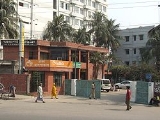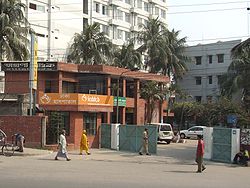
International Centre for Diarrhoeal Disease Research, Bangladesh
Encyclopedia

The International Centre for Diarrhoeal Disease Research, Bangladesh (ICDDR,B) is an international health research organization located in Dhaka
Dhaka
Dhaka is the capital of Bangladesh and the principal city of Dhaka Division. Dhaka is a megacity and one of the major cities of South Asia. Located on the banks of the Buriganga River, Dhaka, along with its metropolitan area, had a population of over 15 million in 2010, making it the largest city...
, Bangladesh
Bangladesh
Bangladesh , officially the People's Republic of Bangladesh is a sovereign state located in South Asia. It is bordered by India on all sides except for a small border with Burma to the far southeast and by the Bay of Bengal to the south...
. Dedicated to saving lives through research
Research
Research can be defined as the scientific search for knowledge, or as any systematic investigation, to establish novel facts, solve new or existing problems, prove new ideas, or develop new theories, usually using a scientific method...
and treatment, ICDDR,B addresses some of the most critical health concerns facing the world today, ranging from improving neonatal survival to HIV/AIDS. In collaboration with academic and research institutions over the world, ICDDR,B conducts research, training and extension activities, as well as programme-based activities, to develop and share knowledge for global lifesaving solutions.
Established in 1978, the Centre is credited, among other accomplishments, with the discovery of oral rehydration therapy
Oral rehydration therapy
Oral rehydration therapy is a simple treatment for dehydration associated with diarrhoea, particularly gastroenteritis or gastroenteropathy, such as that caused by cholera or rotavirus. ORT consists of a solution of salts and sugars which is taken by mouth...
for the treatment of diarrhoea and cholera
Cholera
Cholera is an infection of the small intestine that is caused by the bacterium Vibrio cholerae. The main symptoms are profuse watery diarrhea and vomiting. Transmission occurs primarily by drinking or eating water or food that has been contaminated by the diarrhea of an infected person or the feces...
. Oral rehydration therapy is thought to have saved over 40 million people worldwide.
ICDDR,B is one of the leading research institutes in Bangladesh, releasing, according to the Thomson Reuters Web of Science
Web of Science
ISI Web of Knowledge is an academic citation indexing and search service, which is combined with web linking and provided by Thomson Reuters. Web of Knowledge coverage encompasses the sciences, social sciences, arts and humanities. It provides bibliographic content and the tools to access, analyze,...
, 18 percent of the country's publications.
ICDDR,B has a mix of national and international staff, including public health scientists, laboratory scientists, clinicians, nutritionists, epidemiologists, demographers, social and behavioural scientists, IT professionals, and experts in emerging and re-emerging infectious diseases, vaccine
Vaccine
A vaccine is a biological preparation that improves immunity to a particular disease. A vaccine typically contains an agent that resembles a disease-causing microorganism, and is often made from weakened or killed forms of the microbe or its toxins...
sciences.
Since 1978, the Centre has trained more than 27,000 health professionals from over 78 countries. Courses provide practical training in hospital management of diarrhoeal diseases, epidemiology
Epidemiology
Epidemiology is the study of health-event, health-characteristic, or health-determinant patterns in a population. It is the cornerstone method of public health research, and helps inform policy decisions and evidence-based medicine by identifying risk factors for disease and targets for preventive...
, biostatistics
Biostatistics
Biostatistics is the application of statistics to a wide range of topics in biology...
, family planning
Family planning
Family planning is the planning of when to have children, and the use of birth control and other techniques to implement such plans. Other techniques commonly used include sexuality education, prevention and management of sexually transmitted infections, pre-conception counseling and...
, demographic surveillance, and child survival strategies.
ICDDR,B is supported by about 55 donor countries and organizations, including the Government of Bangladesh, UN specialized agencies, foundations, universities, research institutes and private sector organizations and companies that share the Centre’s concern for the health problems of developing countries and who value its proven experience in helping solve those problems. The Centre is governed by a distinguished multinational Board of Trustees comprising 17 members from all over the world.
Awards and recognitions
In May 2001, ICDDR,B received the first Gates AwardBill & Melinda Gates Foundation
The Bill & Melinda Gates Foundation is the largest transparently operated private foundation in the world, founded by Bill and Melinda Gates. It is "driven by the interests and passions of the Gates family"...
for Global Health from the Bill & Melinda Gates Foundation. The director of ICDDR,B during the time of the discovery of oral rehydration therapy, Dr Dilip Mahalanabis
Dilip Mahalanabis
Dilip Mahalanabis is an India biologist. He was the director of International Centre for Diarrhoeal Disease Research, Bangladesh Dilip Mahalanabis (born November 12th, 1934) is an India biologist. He was the director of International Centre for Diarrhoeal Disease Research, Bangladesh Dilip...
, received the Pollin Prize for 2002 and Mahidol Award for 2005. In 2007, ICDDR,B received the Leadership Award from the Alliance for the Prudent Use of Antibiotics
Alliance for the Prudent Use of Antibiotics
The Alliance for the Prudent Use of Antibiotics is a non-profit organization founded in 1981 by Dr. Stuart B. Levy, Professor of Medicine at Tufts University and headquartered in Boston, Massachusetts....
.
Achievements: Time Line
1960: Cholera research laboratory begins.
1963: Population surveillance – the world’s longest running field site starts in Matlab.
1966: Cholera fatality reduced to less than 1%.
1969 : Oral Rehydration Solution (ORS) is discovered.
1969 : Relationship between breastfeeding and menstruation resumption is demonstrated.
1974 : Tetanus toxoid vaccine recommended, reducing neonatal mortality by 30%.
1978: Rotavirus identified as most common cause of diarrhoea in infants in Bangladesh, and as
highest priority for new vaccines.
1982: Rice-based ORS identified as preferred treatment practice.
1982 : Matlab Maternal Child Health and Family Planning project shares its success in lowering national fertility rates with the Government of Bangladesh.
1983: Epidemic Control and Preparedness Programme begins.
1984 : Full Expanded Programme on Immunization data is validated (and begins). Benefit of measles vaccine demonstrated, leading to inclusion in EPI.
1985: Cholera vaccine trial launched.
1988: Treatment of, and research into, acute respiratory infections/pneumonia begins.
1989 :Matlab record keeping system, specially adapted for Government use, extended to the
national family planning programme.
1993:New Vibrio cholerae 0139 (Bengal strain) identified and characterized by ICDDR,B.
1994: ICDDR,B epidemic response team goes to Goma to assist cholera-stricken Rwandan refugees and
helps reduce mortality from as high as 48.7% to less than 1%.
1995 : Maternal immunization with pneumococcal vaccine shown to be likely to protect infants up to 22 weeks.
1998: HIV sero-surveillance begins in Bangladesh on behalf of Ministry of Health and Family Welfare, Government of Bangladesh.
1999 : Protocolized Management of Severely Malnourished Children decreases case fatality from 20% to less than 5%. Published in Lancet.
2000: ICDDR,B assists Government of Bangladesh with control of major dengue epidemic in Dhaka.
2000: International, peer-reviewed and indexed ICDDR,B journal is renamed Journal of Health Population and Nutrition.
2001: Studies on violence against women in Bangladesh initiated.
2001: ICDDR,B opens the first tuberculosis laboratory in Bangladesh.
2001 :Oral cholera vaccine, tested at ICDDR,B, is approved for use by WHO.
2001: Studies on the effects of arsenic on health begin.
2002: ICDDR,B studies establish that zinc treatment of diarrhoea reduces under-5 mortality by 50%.
2002: First HIV voluntary counselling and testing unit in Bangladesh opens at ICDDR,B.
2003: New research programmes on HIV/AIDS and Poverty & Health.
2004: Studies on preventing high levels of childhood drowning begin.
2005: ICDDR,B team assists in post-tsunami health needs assessment in Sri Lanka.
2006: Dispersible zinc tablets launched through unique public-private partnership in national scale up to treat diarrhoea in children under five years.
2006: Studies on abortion and menstrual regulation initiated.
2007: Oral cholera vaccine Dukoral, tested at Matlab in 1985, launched in Bangladesh.
2008: Introduce SHEBA (an integrated Hospital Management System) and start the journey as a paperless hospital
2009: ICDDR,B opens a ward for ARI (Swine Flu) patients.
2010: ICDDR,B celebrates 50 years of operations. Sends teams to combat deadly cholera outbreaks in Pakistan and Haiti. Research team discovers and characterise the "TLC phage" which changes the chromosomal sequence of the cholera bacterium, enabling incoming toxigenic CTX phage genome to be incorporated and transforming a harmless strain of V. cholerae to a dangerous killer. Issues its first patent from the Director of United States Patent and Trademark Office (United States Patent US7638271) for inventing a new diagnostic method for tuberculosis, called antibodies produced by peripheral blood lymphocytes in culture supernatant, or ALS.
External links
ICDDR,B hosts the secretariat of Child Health and Nutrition Research Initiative CHNRI

